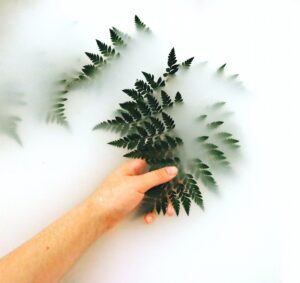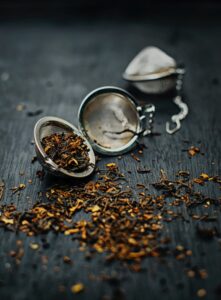THE ART OF A WELL DRAWN BATH
And How It Helps More Than You Know

If after a truly terrible day, do you yearn for a nice, hot bath? Well, keep that habit up, because bathing — or more specifically, hydrotherapy — has great health benefits for your body far beyond just getting clean in a relaxing environment.
Hydrotherapy is a form of alternative medicine used to treat conditions like inflammation and chronic pain. While the health benefits of a hot bath are nothing new, not everyone realizes what all you can do for your body with a tub of hot (or cold) water.
The Health Benefits of Bathing
Your skin is your body’s largest organ, and because it’s porous, it quickly absorbs whatever is in the water. By reason, if you fill the water with healthy minerals, you absorb the nutrients much quicker than if you had swallowed them as a supplement.
 Not only that, hot baths have proven health benefits. For example, one study found that taking regular, hot baths has a moderate but persistent lift in mood for anyone suffering from depression.
Not only that, hot baths have proven health benefits. For example, one study found that taking regular, hot baths has a moderate but persistent lift in mood for anyone suffering from depression.
Another study found that bathing can improve your breathing. The water temperature combined with its pressure on your chest increases your lung capacity and oxygen intake.
Hot water is also known to increase the production of endorphins in your body as well, which help to stimulate your immune system, alleviate pain, and help tissues heal faster if you’re injured.
Other health benefits of baths include:
- May help clear respiratory infections
- Can reduce pain and inflammation for arthritis
- Helps control blood sugar levels
- Relieves muscle cramps and improves blood flow
TCM practitioners caught onto the health benefits of baths long ago, so it’s an alternative therapy that’s been passed down and perfected over centuries.
They found that, by adding concoctions of herbs to the water, you can treat both exterior and interior conditions, ranging from skin sores to inflammation and chronic pain.
You can do so much for your body with the right type of bath, and we break it all down for you below!
Chinese Herbal Baths
 Chinese herbal baths date all the way back to the Shang Dynasty (1027 B.C.). Suffice it to say they pioneered the art of the bath. When it comes to herbal baths, different concoctions of herbs are used to treat specific ailments.
Chinese herbal baths date all the way back to the Shang Dynasty (1027 B.C.). Suffice it to say they pioneered the art of the bath. When it comes to herbal baths, different concoctions of herbs are used to treat specific ailments.
It’s equally important to prepare your bath correctly. Here’s what you need to know:
- The optimal temperature for a hot herbal bath is 100 degrees Fahrenheit
- Boil your herbal mixture for up to 30 minutes before pouring it into your bath water
- Soak your body for 20 to 30 minutes
When it comes to the actual herbs used in your bath, you can buy all kinds of pre-made tinctures and mixtures. Here are a few different types of herbs you can try and their health benefits:
- Chrysanthemum: Chrysanthemum is used to treat respiratory problems, high blood pressure, and hyperthyroidism. It even is said to reduce inflammation.
- Safflower: Safflower is said to soothe dry or inflamed skin and even reduce your risk of heart disease.
- Ginger: Ginger is a great way to detox your body. Specifically, it helps ease digestive discomfort, improves blood circulation, increases metabolism, and can reduce inflammation.
- Bladderwrack seaweed: Bladderwrack floats on the ocean surface and gathers minerals and nutrients from the salt water and the sun, making it a popular herb for a bath. The nutrients in bladderwrack are said to boost your immune system and increase your energy, along with other health benefits.
- Motherwort: Motherwort, also called lion’s mane, contains antioxidant properties and is said to lower your heart rate.
- Perilla leaves: Also used as a common garnish in Asian cooking, perilla extract is said to contain antioxidant, antiallergic, anti-inflammatory, antidepressant, anorexigenic, and even tumor-preventing properties. It’s obviously got a lot of health benefits, making it a great addition to your herbal bath concoction.
- Angelica root: Angelica root helps with insomnia, arthritis, anorexia (or lack of appetite in general), and even intestinal gas.
These are just a few herbs to get you started. When it comes to mixing herbs, be sure to look into their health benefits and talk it over with a TCM practitioner if possible before dipping in!
Chinese Tea Baths
 Imagine all the health benefits derived from drinking tea, and then think about soaking in it. Yes, the Chinese have been soaking in tea for centuries, and that still holds true today.
Imagine all the health benefits derived from drinking tea, and then think about soaking in it. Yes, the Chinese have been soaking in tea for centuries, and that still holds true today.
But how do you make a tea bath? Follow these quick steps:
- Grind up loose leaf tea in a food processor or blender until it’s a powder
- Mix the powder with essential oils, flowers, and salt
- Pour mixture into a tea pouch
- Hang the pouch under your bath’s faucet
- When your tub is full, throw the pouch in the water so it continues to steep
- Enjoy your bath!
That said, different teas have their own health benefits, and you don’t have to mix other herbs if you don’t want to. Here are two go-to tea bath recipes to get you started:
- Green tea: Your bathwater will turn a greenish brown color, but it’s worth it! Green tea is said to help with muscle pain and even contains anti-aging properties. For a decent bath, you’ll want about six pouches of green tea.
- Black tea: Black tea will turn your bathwater a dark brown color. Soaking in black tea is said to reduce inflammation; the tannins in black tea also close your pores, which helps reduce acne.
There’s so much variety with tea, so it’s ok to get a little creative! Just to be sure to research your teas and herbs before bathing in them.
There’s tons of other types of herbs and teas you can combine for the ultimate bath cleanse experience. Here are a few other popular bath-soaking options to pique your interest and get you started:
- Mermaid baths (think tons of seaweed and super healthy skin)
- Epsom salt baths (especially effective for magnesium deficiencies)
- Vinegar and baking soda baths (great for skin issues like eczema or psoriasis)
- Oatmeal baths (a household remedy for poison ivy or poison oak)
- Ice baths (amazing for your muscles and joints following a tough workout)
Got some other bath-soak recipes you’d like to share? Let us know in the comments!
Comments (0)
Leave a reply
You must be logged in to post a comment.




